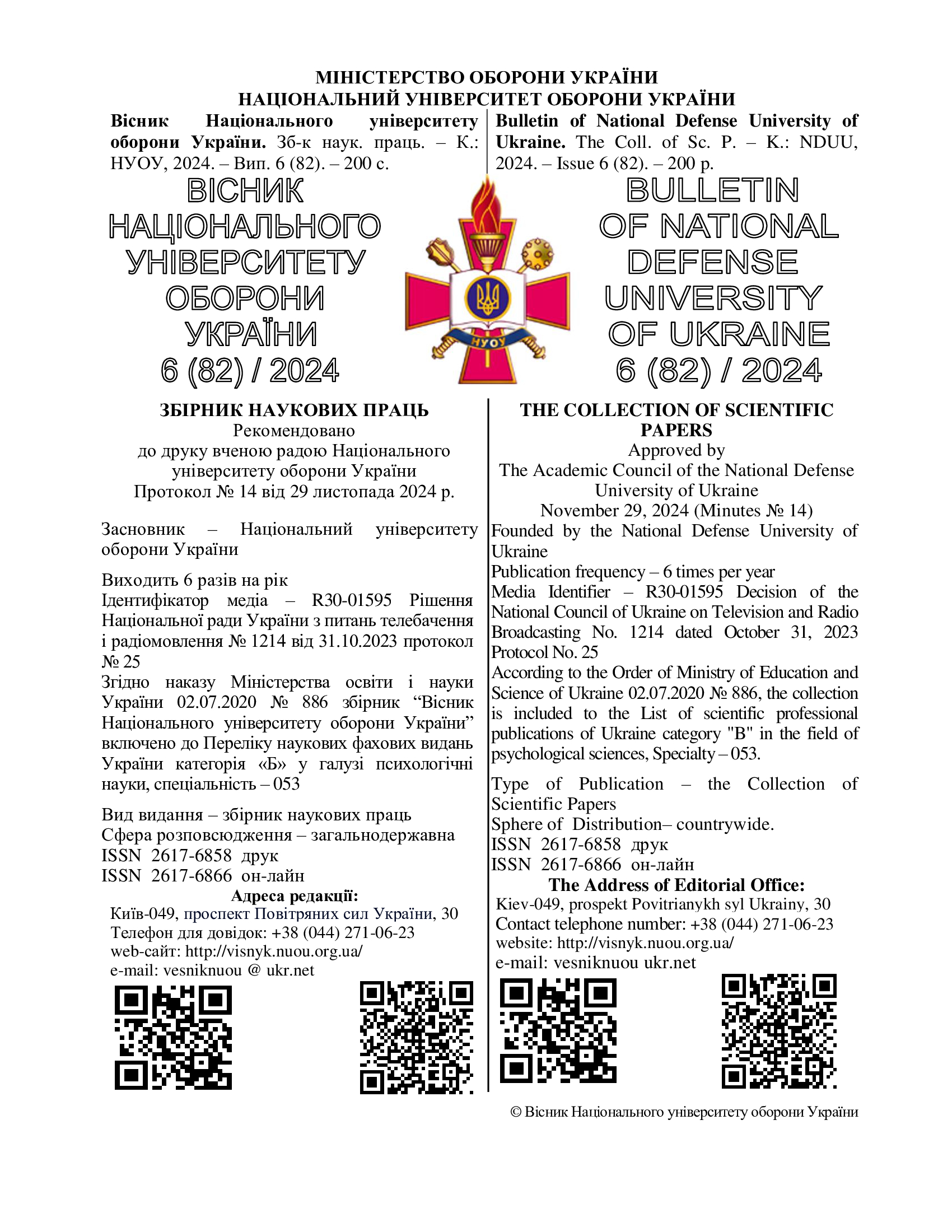ТЕМАТИЧНИЙ АНАЛІЗ У ДОСЛІДЖЕННЯХ СОЦІАЛЬНО-ПСИХОЛОГІЧНИХ ЯВИЩ
DOI:
https://doi.org/10.33099/2617-6858-2024-82-6-188-195Ключові слова:
тематичний аналіз, психолінгвістика, асоціативний експеримент, метод дослідження.Анотація
У статті пропонується практичне керівництво з проведення тематичного аналізу на прикладі досліджень соціально-психологічних явищ у галузі психолінгвістики. Доведено, що використання тематичного аналізу при опрацюванні лексичного матеріалу, отриманого експериментальним шляхом завдяки проведенню асоціативних експериментів, уможливлює вивчення нюансів людської поведінки та соціальних взаємодій.
Завантаження
Посилання
Ayton, D., Tsindos, T., & Berkovic, D. (2023). Qualitative research – a practical guide for health and social care researchers and practitioners. Melbourne, Australia: Council of Australian University Librarians, Open Educational Resources Collective.
Braun, V., & Clarke, V. (2006). Using thematic analysis in psychology. Qualitative Research in Psychology, 3(2), 77–101. https://doi.org/10.1191/1478088706qp063oa
Braun, V., & Clarke, V. (2023). Toward good practice in thematic analysis: Avoiding common problems and be(com)ing a knowing researcher. International Journal of Transgender Health, 24(1), 1–6. https://doi.org/10.1080/26895269.2022.2129597
Braun, V., & Clarke, V. (2024). Supporting best practice in reflexive thematic analysis reporting in Palliative Medicine: A review of published research and introduction to the Reflexive Thematic Analysis Reporting Guidelines (RTARG). Palliative medicine, 38(6), 608–616. https://doi.org/10.1177/02692163241234800
Byrne, D. (2021). A worked example of Braun and Clarke’s approach to reflexive thematic analysis. Quality & Quantity, 56, 1391–1412. https://doi.org/10.1007/S11135-021-01182-Y
Christou, P.A. (2023). How to use thematic analysis in qualitative research. Journal of Qualitative Research in Tourism, 1, 1–17. https://doi.org/10.4337/jqrt.2023.0006
Dawadi, S. (2020). Thematic Analysis Approach: A Step by Step Guide for ELT Research Practitioners. Journal of NELTA, 25(1-2), 62–71. https://doi.org/10.3126/nelta.v25i1-2.49731
DeSantis, L., & Ugarriza, D. N. (2000). The concept of theme as used in qualitative nursing research. Western journal of nursing research, 22(3), 351–372. https://doi.org/10.1177/019394590002200308
Fuchs, K. (2023). A Systematic Guide for Conducting Thematic Analysis in Qualitative Tourism Research. Journal of Environmental Management and Tourism, 14(6), 2696–2703. https://doi.org/10.14505/jemt.v14.6(70).17
Grodal, S., Anteby, M., & Holm, A. L. (2021). Achieving Rigor in Qualitative Analysis: The Role of Active Categorization in Theory Building. Academy of Management Review, 46, 591–612. https://doi.org/10.5465/amr.2018.0482
Inayat, S., Younas, A., Fàbregues, S., & Ali, P. (2024). Premature Closure of Analysis in Qualitative Research: Identifying Features and Mitigation Strategies. International Journal of Qualitative Methods, 23. https://doi.org/10.1177/16094069241234187
Khraban, T., & Khraban, M. (2024). Content analysis in military studies. The Bulletin of National Defence University of Ukraine, 78(2), 141–150. https://doi.org/10.33099/2617-6858-2024-78-2-141-150
Maguire, M., & Delahunt, B. (2017). Doing a Thematic Analysis: A Practical, Step-by-Step Guide for Learning and Teaching Scholars. AISHE-J, 9, 3351–3354. http://ojs.aishe.org/index.php/aishe-j/article/view/3354
Neuendorf, K. A. (2018). Content analysis and thematic analysis. In P. Gough (Ed.), Advanced research methods for applied psychology (pp. 211–223). Routledge. https://doi.org/10.4324/9781315517971-21
Nowell, L. S., Norris, J. M., White, D. E., & Moules, N. J. (2017). Thematic Analysis: Striving to Meet the Trustworthiness Criteria. International Journal of Qualitative Methods, 16(1). https://doi.org/10.1177/1609406917733847
Roberts, K., Dowell, A., & Nie, J. B. (2019). Attempting rigour and replicability in thematic analysis of qualitative research data; a case study of codebook development. BMC medical research methodology, 19(1), 66. https://doi.org/10.1186/s12874-019-0707-y
Smith, B., & McGannon, K. (2018). Developing rigor in qualitative research: problems and opportunities within sport and exercise psychology. International Review of Sport and Exercise Psychology, 11(1), 101–121. https://doi.org/10.1080/1750984x.2017.1317357
Vaismoradi, M., Turunen, H., & Bondas, T. (2013). Content analysis and thematic analysis: Implications for conducting a qualitative descriptive study. Nursing & health sciences, 15(3), 398–405. https://doi.org/10.1111/nhs.12048
##submission.downloads##
Опубліковано
Як цитувати
Номер
Розділ
Ліцензія
Авторське право (c) 2024 Вісник Національного університету оборони України

Ця робота ліцензується відповідно до Creative Commons Attribution-NonCommercial-ShareAlike 4.0 International License.





